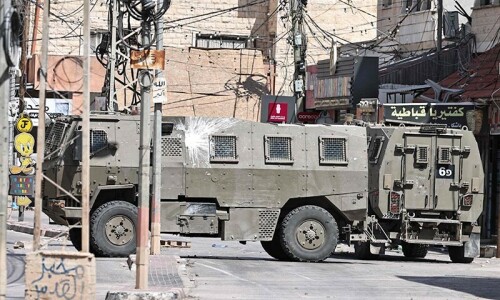 Pakistan direly needs a breathing space amid concerns about a possible debt default. The debt servicing, at over $3 billion a year is getting out of hand and import financing is becoming more difficult.
Pakistan direly needs a breathing space amid concerns about a possible debt default. The debt servicing, at over $3 billion a year is getting out of hand and import financing is becoming more difficult.
The radar so proudly installed in the world capitals by the previous government through the sovereign bonds is adding fuel to the fire and the begging bowl is out once again.
The government is exploring all possible avenues to secure at least $6 billion to stay afloat in the short-term. But in difficult times, lenders impose terms of their own choice and the borrower can’t resist arm twisting. The international lenders – the World Bank, Asian Development Bank and the International Monetary Fund - have just concluded their top level consultations in Islamabad and the political leadership is seeking help of “friends of Pakistan” in New York to bailout South Asia’s second-largest economy from the danger of default.
The investor’ confidence has been marred by worsening macroeconomic indicators and poor security situation. Pakistan has become one of the world’s riskiest sovereign borrower as foreign exchange reserves halved to $8.8 billion on September 25 from $16.5 billion last October.
Some analysts believe that the State Bank of Pakistan may be forced to do away with the free floating currency regime by short capping rupee-dollar parity at Rs75 or so. Credit-default swaps on Pakistan’s $2.7 billion of foreign currency sovereign bonds have surged to 1,500 basis points which mean it costs $1.5 million annually to protect $10 million of the country’s debt from default for five years, triple the cost on Lebanon’s debt.
In the circumstances, only an IMF programme coupled with the World Bank and ADB financing, that has already triggered a set of difficult economic adjustments, could not be the only way out. In the medium-to-long-term, the assistance from “Friends of Pakistan” for continued investment and other immediate support has become unavoidable. It was in this background that the government announced last week an economic stabilisation plan for asset sales, elimination of subsidies, etc.
Instead of relying on budgeted Rs25 billion privatisation proceeds, the government now plans to speed up 16 transactions for completion this year. But can these sales attract reasonable price for family gold in depressing economic situation is yet to be seen.
The difficulties have mounted on the back of continued pressure from the United States on new government to make extra efforts to curb rising militancy. The financing by IMF and World Bank have always been on political considerations. The assurance by the World Bank chief in New York to President Zardari that $1.3 billion assistance package was in the pipeline, analysts suggest, would materialise when Islamabad fully agrees to the Bush administration’s demand; and so would be the bailout package from the IMF.
Although the IMF has yet to come up with its final draft of recommendations, it has already advised a revision of the major macroeconomic targets by mobilising additional revenues and cutting down expenditure. As forecast by the Asian Development Bank, the IMF too, has asked Islamabad to reduce GDP growth target to 4.5 instead of 5.5 per cent, increase inflation target to 20 instead of 11 per cent, and contain fiscal deficit at 4.3 instead of 4.7 per cent.
The IMF is reported to have asked Islamabad to increase tax collection target set at Rs1.25 trillion because of the depreciation in rupee value, to reduce fiscal deficit.
In the long -term, the only solution could be continued investments by the private sector – an area where the “Friends of Pakistan” could help to spur growth. This is more important given the fact that manufacturing and agriculture output may not perform as projected because of continued energy shortages and reduced water availability.
“Friends of Pakistan” is a new initiative launched by the PPP government to garner urgently required economic support from leading international industrial states because some brotherly countries were finding it politically difficult to go alone in providing substantial support to ailing economy.
The forum introduced in New York on the sidelines of the UN General Assembly session comprised United States, United Kingdom, Canada, France, Germany, Italy, Japan, China, Saudi Arabia, the UAE, Australia and Turkey. Politics will have a major role here too and the outcome is yet to be seen. Pakistan expects these nations could provide substantial short-term cushion and enable long-term investments as well.
The respective governments have been failing to take effective steps for additional resource mobilisation and have largely remained dependant on the existing taxpayers to increase revenue. Difficult times required tough solutions.
There are many areas of economy which take away major part of the fruits of economic growth without contributing towards national growth and poverty reduction.
The time has come for the sacred cows to share the burden with the general public and steer the economy out of continued crisis through home-grown contributory effort rather than living on borrowed money that evaporates in difficult times and results in compromising national interests.
















































Dear visitor, the comments section is undergoing an overhaul and will return soon.